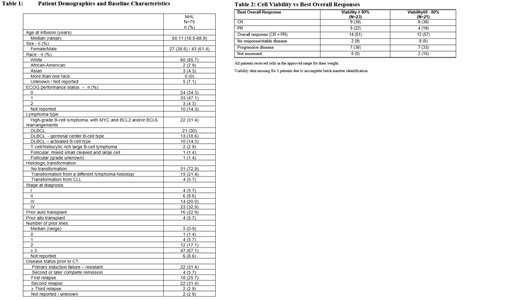Introduction
Tisagenlecleucel is a CD19-directed genetically modified autologous T-cell immunotherapy approved for the treatment of adult patients with relapsed or refractory large B-cell lymphoma after two or more lines of systemic therapy including diffuse large B-cell lymphoma not otherwise specified (DLBCL-NOS), high grade B-cell lymphoma and DLBCL arising from follicular lymphoma. In the pivotal JULIET trial, 115 patients received tisagenlecleucel treatment; the best overall response rate (ORR) was 54% and complete response (CR) rate was 40%. At a median follow-up of 24 months, the median duration of response was not reached. Grade 3 or higher cytokine release syndrome (CRS) (UPenn scale) and neurotoxicity within the first 8 weeks after infusion occurred in 22.6% and 11.3%, respectively (Bachanova et. al. Hematol Oncol. Abstr 2019). CIBMTR CT Registry was developed to collect long-term safety and efficacy information on recipients of cellular immunotherapies and it is utilized for a post marketing study of tisagenlecleucel in the real-world setting.
Methods
Clinical data from the registry were analyzed for baseline information. Efficacy and safety data were collected from patients with a minimum of 3 months follow-up. CRS and immune effector cell-associated neurotoxicity syndrome (ICANS) were reported as per the consensus ASTCT criteria. Important manufacturing product characteristics of tisagenlecleucel were compared to clinical outcomes obtained by the CIBMTR CT registry. The association of number of cells administered, cell viability, potency, and transduction efficiency to overall response, CRS and
ICANS grade was performed using descriptive summaries and univariate logistic regression analyses. Tisagenlecleucel cell product characterization by immunophenotyping was also compared to clinical outcomes in the CIBMTR Registry.
Results
Twenty-six centers contributed data for relapsed/refractory DLBCL patients through the CIBMTR CT registry as of May 31, 2019. Baseline information was available in 70 patients while outcomes ≥ 3 months post-infusion was available on 47 patients (Table 1). All patients received cells in the FDA approved range (0.6 to 6 x 108 CAR+ viable T cells) with a median of 1.7 x 108 (range 0.6-3.5 x 108). The median follow-up time for survivors was 5.8 months (0.9-8.9 months). The overall response rate (ORR) was 59.6% (28 of 47 patients) including 38.3% (18 patients) achieving a CR. The rate of grade 3 or higher CRS and ICANS was 4.3% and 4.3%, respectively. Tocilizumab and corticosteroids were administered in 40.9% and 9.1% among patients who had CRS. The median time to onset of CRS was 4.5 days and lasted for an average of 5 days. A total of 14 (29.8%) patients died after treatment, all due to disease progression and no deaths were attributed to toxicities from tisagenlecleucel. A secondary malignancy was reported in 1 patient (basal cell carcinoma) that was present prior to CAR-T cell infusion. Out of the products manufactured for these 47 patients, 21 were out-of-commercial specification (OOS) because of low cell viability (< 80%), however, efficacy and safety outcomes were similar to those with batches meeting viability specifications. None of the manufacturing characteristics analyzed (such as cell viability, potency or transduction efficiency) correlated with either efficacy (ORR) or safety (CRS or ICANS). Importantly, analysis of cell viability showed no association with best overall response (Table 2).
Conclusions
The CIBMTR CT registry represents real-world data for the treatment of adults with DLBCL and allows capture of long-term follow up (15 years). The efficacy and safety in the real world setting demonstrate similar efficacy and safety as compared with the pivotal JULIET trial. Cell product characteristics analyzed, including percentage of viable cells, do not correlate with response rates, CRS or ICANS. Updated results, including tisagenlecleucel cell product characterization, will be presented at the meeting.
Kamdar:Seattle Genetics: Speakers Bureau; Pharmacyclics: Consultancy; Celgene: Consultancy; AstraZeneca: Consultancy; University of Colorado: Employment. Perales:Medigene: Membership on an entity's Board of Directors or advisory committees; Servier: Membership on an entity's Board of Directors or advisory committees; Kyte/Gilead: Research Funding; Miltenyi: Research Funding; Merck: Consultancy, Honoraria; Takeda: Honoraria, Membership on an entity's Board of Directors or advisory committees; MolMed: Membership on an entity's Board of Directors or advisory committees; NexImmune: Membership on an entity's Board of Directors or advisory committees; Abbvie: Honoraria, Membership on an entity's Board of Directors or advisory committees; Bellicum: Honoraria, Membership on an entity's Board of Directors or advisory committees; Bristol-Meyers Squibb: Honoraria, Membership on an entity's Board of Directors or advisory committees; Incyte: Honoraria, Membership on an entity's Board of Directors or advisory committees, Research Funding; Nektar Therapeutics: Honoraria, Membership on an entity's Board of Directors or advisory committees; Novartis: Honoraria, Membership on an entity's Board of Directors or advisory committees; Omeros: Honoraria, Membership on an entity's Board of Directors or advisory committees. Nikiforow:Kite/Gilead: Honoraria; Novartis: Honoraria; NKarta: Honoraria. Jeschke:Novartis: Employment. Chawla:Novartis Pharma AG: Employment. Horowitz:Mesoblast: Other: Unrestricted educational and research grant, Research Funding; Gamida Cell: Other: Unrestricted educational and research grant, Research Funding; Chimerix: Other: Unrestricted educational and research grant; Janssen: Other: Unrestricted educational and research grant, Research Funding; Pharmacyclics: Other: Unrestricted educational and research grant; Daiichi Sankyo: Other: Unrestricted educational and research grant; Miltenyi Biotech: Other: Unrestricted educational and research grant, Research Funding; CSL Behring: Other: Unrestricted educational and research grant, Research Funding; Regeneron: Other: Unrestricted educational and research grant; Sanofi: Other: Unrestricted educational and research grant, Research Funding; Bristol-Myers Squibb: Other: Unrestricted educational and research grant, Research Funding; Seattle Genetics: Other: Unrestricted educational and research grant; Actinium: Other: Unrestricted educational and research grant; GlaxoSmithKline: Other: Unrestricted educational and research grant; Amgen: Other: Unrestricted educational and research grant; Kite Pharma/Gilead: Other: Unrestricted educational and research grant, Research Funding; Magenta: Consultancy, Other: Unrestricted educational and research grant; Shire: Other: Unrestricted educational and research grant; Oncoimmune: Other: Unrestricted educational and research grant. Bleickardt:Novartis: Employment. Pasquini:Pfizer: Other: Advisory Board; Amgen: Consultancy; Medigene: Consultancy; BMS: Research Funding; Kit Pharma: Research Funding; Novartis: Research Funding.
Author notes
Asterisk with author names denotes non-ASH members.


This feature is available to Subscribers Only
Sign In or Create an Account Close Modal